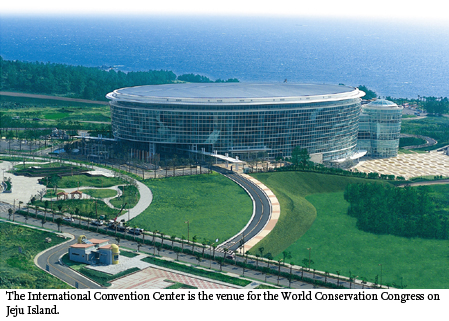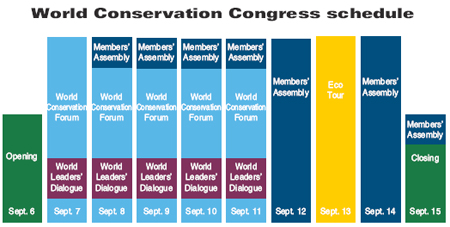Korea’s 1st-ever WCC to open on Jeju

Baengnokdam, the crater at the top of Mt. Halla on Jeju Island, is one of 51 attractions that the Korean Organizing Committee for the 2012 World Conservation Congress will introduce during an eco-tour on Sept. 13. / Courtesy of the Korean Organizing Committee for the 2012 World Conservation Congress
Participants to tackle environmental challenges
A record number of 10,000 delegates from more than 170 countries will participate in the 2012 World Conservation Congress that kicks off its 10-day run on Jeju Island on Thursday.
The delegates include global environmental leaders and experts from the United Nations (U.N.), government agencies, nongovernmental organizations (NGOs), firms, and activists.
Matching the size of attendance, hundreds of programs will be presented at the world’s oldest and largest environmental conference organized by the International Union for Conservation of Nature (IUCN) since 1948.
“The unprecedented scale and quality of the Jeju Congress will prove why this IUCN conference is dubbed as the ‘Environmental Olympics,’” said Lee Hong-koo, chairman of the organizing committee. “And I guarantee that the conference will be remembered as the best-ever meeting.”
IUCN President Ashok Khosla echoed a similar view: “It is my personal hope that this will be the best-ever World Conservation Congress ― and with a little goodwill on all sides, I don’t see why it would not be.”
The IUCN boasts of the world’s largest global environmental network with 89 state-members, 124 government agencies, and 1,018 NGOs that can influence future laws and policies.
The IUCN and U.N. Environment Program (UNEP) are close partners with expertise in their respective areas of focus. IUCN puts weight on science-based understanding of all issues related to biodiversity, while UNEP focuses on broader areas, including all environmental issues, not just biodiversity. For biodiversity expertise, UNEP, however, relies heavily on IUCN, according to Khosla.
The quadrennial conference co-hosted by the IUCN, the Ministry of Environment and Jeju Self-Governing Province will present its theme “Resilient Nature,” with five agendas ― climatic change, food security, green economy, governance over natural resources, and protection of biodiversity
The Jeju Congress at the International Convention Center is especially significant in a way that the international environmental meetings need “momentum,” according to Lee.
“And the Jeju conference with unique programs will surely bring attention of the international community to raise awareness of global environmental challenges,” he said.
Main program to stimulate interactive talks
The World Leaders’ Dialogue is the main program that is newly featured from this 23rd World Conservation Congress. The dialogue will feature 30 global environmental leaders and experts, including Achim Steiner, executive director of UNEP; Bharrat Jagdeo, former President of Guyana; and Lyonpo Kinzang Dorji, former Prime Minister of Bhutan; and Yoo Young-sook, Korean minister of environment.
The IUCN introduced the program to facilitate active feedback and “thought-provoking” debates among experts and members of the general audience.
The program will run from Sept. 7 to 11 and is divided into five sessions. Each will discuss one of five issues under the theme “Resilient Nature.”
The 90-minute sessions will start at 5 p.m. at the Tamna Hall of the International Convention Center.
At each session, the audience can ask questions and also express their thoughts on an issue. All five sessions will also be aired in real-time broadcasting through the IUCN website (www.iucn.org/congress) or through the organizing committee’s website (www.wcc2012.or.kr).
The 30 delegates are divided into five groups depending on the issue and they will participate as either moderators or panelists.
Five of the delegates are Koreans, such as Minister Yoo. As a panelist, she will address Korea’s efforts to conserve nature at the Sept. 11 session.
Another Korean representative is Young Soo-gil, co-chairperson of the Presidential Committee on Green Growth. He will be one of the panelists, including Steiner at the Sept. 9 session on green economy.
Korea-related agendas
The 450 forums that will run from Sept. 7 to 11 are divided into four parts, such as discussion workshops, conservation campuses, knowledge cafes and poster exhibitions.
The topics will deal with the fives issues under the theme “Resilient Nature.” Many of them will deal with Korea-related agendas and will help secure global interest and cooperation in Korea’s environments, such as a conservation strategy for Demilitarized Zone (DMZ), cooperation for sustainable management and conservation of the Baekdu Great Mountain Range, mud flat conservation, and international cooperation to reduce dust storms.
Lee noted that some of the issues are politically-sensitive that the IUCN tries to avoid.
“However, I believe the participants will eventually agree that the conservation of biodiversity is essential with a rising concern for global challenges and a rising demand for green economy,” he said.
Eco-tourism to unveil attractions of Jeju
The eco-tourism program on Sept. 13 will be offered to enable participants to experience Korea’s southernmost Jeju Island preserved in nature.
The island is noted with UNESCO titles, namely a Biosphere, a Natural World Heritage site and nine Geoparks, three Ramsar sites. And the program will unveil must-see attractions of the island.
The program is comprised of two parts. A one-day tour with 51 courses on Jeju will show its natural environment, history and culture, and future environment while a two-day nationwide tour to give a chance to enjoy ecological resources of Korea.
‘Green congress’
Along with programs that tackle problems on environmental issues, Chairman Lee expects the International Convention Center and operation of the conference to also help raise awareness about renewable energy.
The conference venue is remodeled as an eco-friendly facility by building infrastructure, such as a photovoltaic power system, energy management system, and energy-saving elevators.
The congress will be running through LED TVs and tablets to minimize the use of paper by realizing a “green congress” or “smart congress.”
Electric shuttle buses will run from the conference venue to hotels in Jungmun Resort. And 20 hybrid vehicles and 20 electric cars will be provided for VIPs and IUCN staff respectively. The organizing committee will also arrange bicycles at the convention center and hotel areas, to encourage congress participants to use green transportation.
Guidebooks on Jeju will be available at official accommodations, such as hotel rooms and restaurants, during the congress.
Jeju Declaration
A summary of key agreements at the congress will be presented for the first time in ICUN conference history under the name “Jeju Declaration.”
Lee said Korea’s green growth is likely to be included as a part of the declaration, and will serve as a guideline for international policies until the upcoming conference. <The Korea Times/Yi Whan-woo>




























































